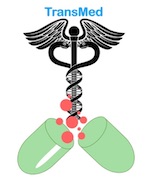TransMed 2025
Description

Knowledge-based translational medicine is a rapidly growing discipline in biomedical research and aims to expedite the discovery of new diagnostic tools and treatments by using a multi-disciplinary, highly collaborative, "bench-to-bedside" approach. Large amounts of multi-omics, imaging (medical and molecular) and clinical data can now be captured for given patient populations. In addition to the challenges of data curation and harmonisation, new computational methods are required to identify molecular signatures that suggest disease subtype. These signatures may be predictive of outcome or progression, and impact on disease management by suggesting personalised therapeutic strategies for patients. Such approaches will further the development of a new taxonomy of disease.
In the TransMed COSI meeting, we will explore the current status of computational biology approaches within the field of translational medicine.
Information of previous TransMed meeting(s) can be found here.
Link to the ISMB/ECCB 2025 website is: here.
Please note:
The TransMed 2025 meeting takes place in Liverpool, UK, on July 22, 2025, during the ISMB/ECCB 2025 conference.
Topics of interest
Topics of interest include, but are not limited to:
* Clinical and molecular data storage and integration infrastructure, including: data warehousing for translational medicine, multi-‘omics and clinical data integration, data visualization in translational medicine
* Curation and harmonization of clinical, ‘omics and imaging data, including: standards and ontologies in translational medicine, biomedical text mining and semantic representation
* Data analytics for patient stratification, biomarker and target discovery, including: disease subtype discovery, Electronic Health Records integration, translational imaging, multi-scale modelling, high performance and cloud computing in translational medicine, mathematical modelling for disease processes, pathways and networks
* Computational approaches for target selection and drug discovery, including: druggability assessment and target selection, polypharmacology, drug reuse, chemical library design, virtual screening technologies, drug discovery enabler pipelines and databases, chemical tool analysis
* ADME/PK and Tox models, including: databases and modeling approaches for ADME and PK, machine learning approaches to predicting toxicity, modeling of pharmacokinetics to man and model organism utility models
* Translational Medicine Informatics Applications/Case Studies, including: Next generation sequencing annotation and biomedicine applications, clinical data integration and application
Keynote speakers
TBD.
Agenda
Please check it [here]. [TBD].
Abstract submission
Please follow the abstract submission indications from the ISMB/ECCB 2025 website.
Key dates
Detailed information can be found: here.
Registration
Please follow the registration page on the ISCB website.
Organizing committee
Venkata Satagopam - Luxembourg Centre For Systems Biomedicine (LCSB), University of Luxembourg, Luxembourg
Reinhard Schneider - Luxembourg Centre For Systems Biomedicine (LCSB), University of Luxembourg, Luxembourg
Maria Secrier - University College London, UK
Irina Balaur - Luxembourg Centre For Systems Biomedicine (LCSB), University of Luxembourg, Luxembourg
Irene Ong - University of Wisconsin-Madison, USA
Wei Gu - Luxembourg National Data Service (LNDS), Luxembourg
Heba Sailem - King’s College London, UK
Mansoor Saqi - King’s College London, UK
Evert Bosdriesz - Vrije Universiteit Amsterdam, NL
Sikander Hayat - Uniklinik RWTH Aachen, Germany
Anne Lorant - Luxembourg Centre For Systems Biomedicine (LCSB), University of Luxembourg, Luxembourg
Sandrine Medves - Luxembourg Centre For Systems Biomedicine (LCSB), University of Luxembourg, Luxembourg
Meet the Organizing committee here.
Programme committee (alphabetical order)
TBD
Contact us
If you have any questions, please do not hesitate to contact us by our slack workspace.
Follow us
Twitter: @TransMedISMB
Linkedin: Translational Medical Informatics Group
Open positions
Please check our page on open positions here. Alternatively, please feel free to contact us directly.
Acknowledgement
The current TransMed logo was designed by Belinda Hanson.